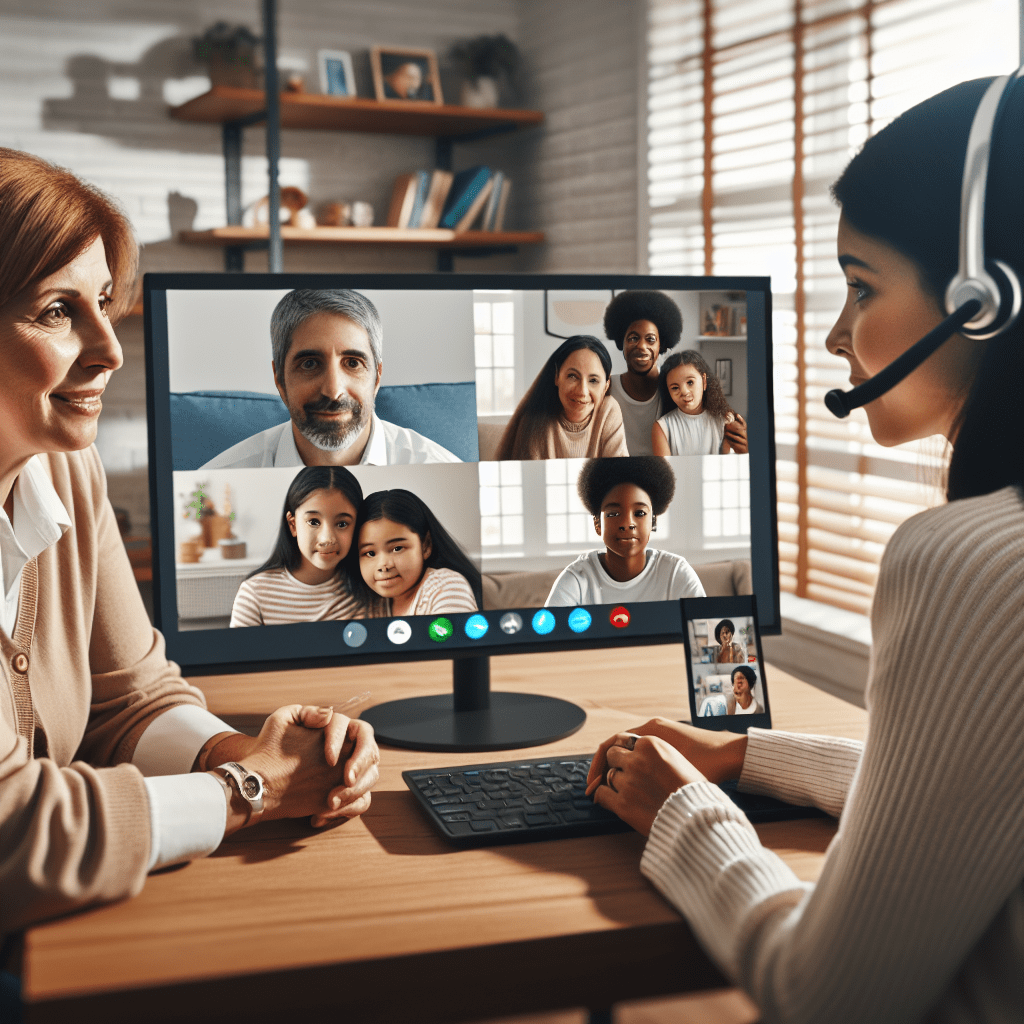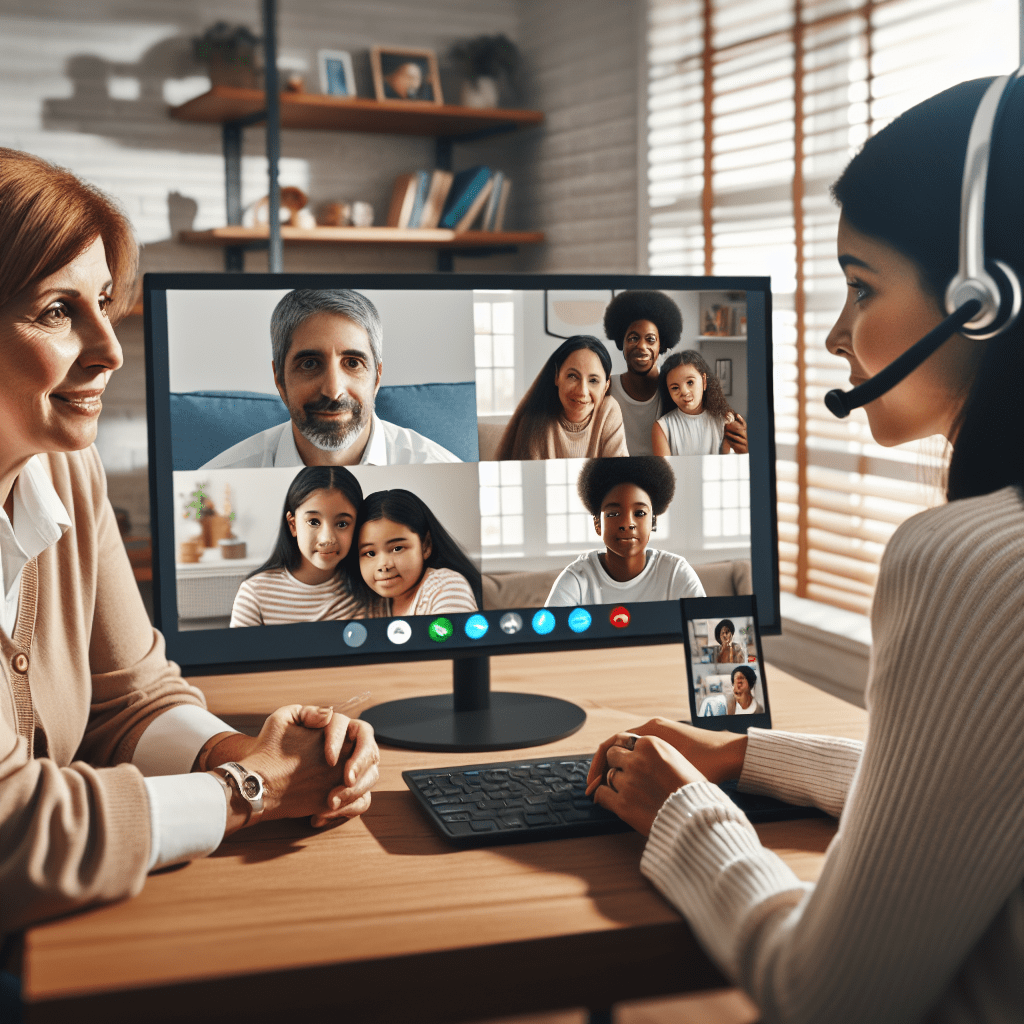Imagine being able to attend family therapy sessions from the comfort of your own home. No more rushing to appointments or juggling schedules, just a convenient and accessible way to address your family’s concerns. But can family therapy be conducted effectively online? In this article, we will explore the possibilities and challenges of virtual family therapy sessions, examining the benefits and potential drawbacks of this increasingly popular approach. So, grab a cup of tea and join us as we venture into the world of online family therapy.

Advantages of Online Family Therapy
Convenience and accessibility
One of the major advantages of online family therapy is the convenience and accessibility it offers to clients. With online therapy, you can easily connect with a therapist from the comfort of your own home or any location that is convenient for you. This eliminates the need to commute to a physical therapy office, saving you both time and money. Additionally, online therapy allows you to receive therapy services regardless of your geographical location, making it accessible to individuals who may live in remote areas or have limited access to traditional therapy services.
Flexibility in scheduling
Online family therapy also provides greater flexibility in scheduling compared to traditional in-person therapy. It eliminates the need to coordinate schedules with multiple family members and allows for sessions to be easily scheduled during evenings or weekends when everyone is available. This flexibility can be especially beneficial for families with busy schedules, allowing them to prioritize therapy without major disruptions to their daily routine.
Greater comfort for clients
Engaging in therapy sessions from the comfort of your own home can create a more relaxed and comfortable environment for clients. Being in a familiar setting can help reduce anxiety and increase your willingness to open up and share your thoughts and feelings. For children or adolescents who may feel more at ease in their own space, online therapy can create a safe and non-threatening environment for them to participate in family therapy.
Reduced stigmatization
Online family therapy can help reduce the stigmatization often associated with seeking therapy. Some individuals may feel uncomfortable attending therapy sessions in person due to the fear of being seen or recognized by others. Online therapy allows clients to maintain their privacy and seek help without the worry of judgment or stigma. This can be particularly important for individuals who are hesitant about seeking therapy due to cultural, social, or personal reasons.
Challenges and Limitations of Online Family Therapy
Lack of physical presence
One of the main challenges of online family therapy is the lack of physical presence. In traditional therapy settings, therapists can observe nonverbal cues such as body language, facial expressions, and overall demeanor, which can provide valuable insights into a client’s emotions and experiences. In an online setting, these nonverbal cues may be less visible or distorted, making it more challenging for therapists to accurately assess and respond to their clients.
Technical difficulties
Another challenge of online family therapy is the potential for technical difficulties. Poor internet connection, audio or video glitches, and other technology-related issues can interrupt the flow of therapy sessions and hinder effective communication. Such technological challenges can be frustrating for both clients and therapists and may disrupt the therapeutic process.
Nonverbal communication limitations
Nonverbal communication plays a crucial role in understanding and building connections in family therapy. In an online setting, the limitations of nonverbal communication can be a major drawback. Subtle cues such as gestures, eye contact, and physical touch may be more difficult to convey or receive through a video conference. Therapists must be mindful of these limitations and find alternative ways to understand and address nonverbal communication during online sessions.
Privacy and security concerns
Privacy and security concerns are important considerations in online family therapy. While strict confidentiality measures should be in place, there is a potential risk of unauthorized access to confidential information during online sessions. It is essential for therapists to use secure and encrypted platforms and for clients to ensure their privacy settings are optimized to protect the confidentiality of their therapy sessions.
Research Supporting Effectiveness of Online Family Therapy
Multiple studies demonstrating positive outcomes
A growing body of research supports the effectiveness of online family therapy. Numerous studies have shown positive outcomes for families who have participated in online therapy. These studies indicate improvements in family dynamics, communication skills, and individual well-being. The evidence suggests that online therapy can be just as effective as face-to-face therapy in addressing a wide range of family issues.
Comparative effectiveness with traditional in-person therapy
Studies comparing the effectiveness of online family therapy with traditional in-person therapy have found comparable outcomes between the two modalities. Research has shown that online therapy can be equally as effective in improving family relationships, reducing symptoms of mental health disorders, and enhancing overall family functioning. This evidence supports the idea that online therapy can be a viable and effective alternative to traditional therapy methods.
Improved engagement and satisfaction levels
Online family therapy has been associated with increased engagement and satisfaction levels among clients. The convenience and comfort of participating in therapy sessions from home can contribute to higher levels of engagement and motivation in the therapeutic process. Clients may also feel more empowered in their virtual environment, leading to increased satisfaction with the therapy experience.

Adapting Therapeutic Techniques for Online Format
Facilitating active participation
Therapists can adapt therapeutic techniques to facilitate active participation in online family therapy. Utilizing interactive exercises, role-playing, and other engaging activities can help keep family members invested and involved in the therapy process. Therapists can also encourage open dialogue and active listening skills to ensure that each family member feels heard and valued.
Utilizing videoconferencing tools effectively
Effective use of videoconferencing tools is crucial for successful online family therapy sessions. Therapists should be familiar with the features and functionalities of the chosen videoconferencing platform and ensure that clients are comfortable navigating the technology. Activities such as screen sharing, whiteboard tools, and breakout rooms can enhance the therapeutic experience and promote active engagement.
Enhancing virtual communication and connection
Therapists can employ strategies to enhance virtual communication and connection during online family therapy. This can include using visual aids, such as diagrams or charts, to help illustrate key concepts or patterns within the family dynamics. Additionally, therapists may encourage family members to communicate through chat or messaging features in the videoconferencing platform to address specific issues or concerns that may arise during the session.
Special Considerations for Online Family Therapy
Ensuring equal participation
In online family therapy, therapists must be mindful of ensuring equal participation among all family members. The virtual nature of online therapy may unintentionally create barriers that hinder certain family members from actively engaging in the therapeutic process. Therapists should actively encourage and facilitate the involvement of each family member, ensuring that their perspectives and experiences are valued and heard.
Managing potential interruptions and distractions
As therapy sessions take place within the client’s home environment, there is an increased potential for interruptions and distractions. Therapists should work collaboratively with families to establish ground rules and strategies to minimize distractions during sessions. This may involve creating a quiet and private space for therapy, setting boundaries with other household members, or utilizing headphones to maintain focus.
Addressing power dynamics in a virtual setting
Power dynamics within a family may be magnified or altered in an online therapy setting. It is essential for therapists to be attuned to these dynamics and address them explicitly in the therapeutic process. Creating a safe and emotionally supportive environment where all family members feel empowered to express themselves is crucial to ensuring a balanced and effective therapeutic experience.
Ethical and Legal Considerations
Maintaining client confidentiality
Maintaining client confidentiality is a fundamental ethical principle in online family therapy. Therapists must adhere to legal and ethical guidelines regarding the storage and transmission of client information. This includes using secure and encrypted platforms, obtaining informed consent for recording sessions, and implementing appropriate measures to protect client privacy.
Verifying client identity and consent
Therapists conducting online family therapy must verify the identity of their clients to ensure the safety and well-being of all participants. It is essential to implement procedures to confirm client identity and obtain informed consent for therapy services. This can be done through secure video calls, requiring the use of unique login credentials, or other identity verification methods.
Following jurisdictional regulations
Therapists providing online family therapy must adhere to jurisdictional regulations and licensing requirements. Different jurisdictions may have specific guidelines and restrictions regarding the provision of online therapy services, including cross-border practice. Therapists should familiarize themselves with the laws and regulations applicable to their practice and ensure compliance to maintain ethical and legal standards.
Training and Competence for Online Family Therapy
Acquiring necessary technological skills
Therapists interested in conducting online family therapy should acquire the necessary technological skills to ensure proficiency in using videoconferencing platforms, troubleshooting technical issues, and utilizing online therapy tools effectively. This may include attending training workshops, seeking mentorship, or obtaining certifications in telehealth technologies.
Learning about online therapy ethics and guidelines
Therapists must familiarize themselves with online therapy ethics and guidelines specific to their jurisdiction. Understanding the unique ethical considerations and potential challenges of providing therapy in an online format is essential for maintaining professional integrity and safeguarding client well-being. Continuing education opportunities, professional associations, and resources can help therapists stay updated on best practices and ethical guidelines for online family therapy.
Seeking specialized training and supervision
Therapists transitioning to online family therapy should consider seeking specialized training and supervision in this modality. There are numerous online training programs and workshops available that provide comprehensive guidance on the unique aspects of conducting therapy sessions online. Engaging in supervision or consultation with experienced online therapists can also be invaluable in navigating the challenges and nuances of online therapy.
Client Suitability and Selection
Identifying appropriate candidates for online therapy
Not all individuals or families may be suitable for online family therapy. Therapists should carefully assess potential clients’ specific circumstances and determine if the online format is suitable and safe for their therapeutic needs. Factors such as the severity of mental health concerns, presence of safety risks, or the need for specialized interventions may influence the suitability of online therapy.
Considering client preferences and comfort levels
Client preferences and comfort levels should be taken into account when considering online family therapy. Some individuals may have reservations or preferences regarding online therapy, and it is essential to respect and address their concerns. Engaging in open and transparent discussions with potential clients can help determine if online therapy aligns with their preferences and therapeutic goals.
Assessing potential risks and benefits
Therapists should assess the potential risks and benefits of online family therapy on a case-by-case basis. This includes evaluating the specific needs and challenges of the family, their access to technology and reliable internet connection, and any potential safety concerns. Weighing these factors can help make informed decisions about the suitability of online therapy and create appropriate treatment plans.
The Role of Therapists in Online Family Therapy
Creating a safe and trusting therapeutic environment
Therapists play a vital role in creating a safe and trusting therapeutic environment in online family therapy. Establishing rapport, demonstrating empathy, and actively listening to family members’ concerns are essential for building trust and facilitating open communication. Therapists should create a non-judgmental and supportive space where family members feel comfortable sharing their thoughts and emotions.
Promoting effective communication and conflict resolution
Therapists should guide and facilitate effective communication and conflict resolution techniques during online family therapy. This may include teaching active listening skills, providing tools for expressing emotions constructively, and helping family members develop strategies for resolving conflicts. Therapists should also actively model effective communication techniques to encourage healthier patterns of interaction within the family.
Building rapport and fostering meaningful connections
Building rapport and fostering meaningful connections with each family member is crucial in online family therapy. Therapists should invest time in understanding family dynamics, individual experiences, and cultural backgrounds to tailor therapy approaches that resonate with each family member. By establishing strong therapeutic alliances, therapists can help foster positive change within the family system.
Future Directions and Recommendations
Continued research and evaluation
Continued research and evaluation are necessary to advance the field of online family therapy. Future studies should explore the long-term outcomes of online therapy, the specific populations that may benefit most from this modality, and the mechanisms through which online therapy facilitates change within families. Rigorous research can inform best practices and guide further advancements in online family therapy.
Improved telehealth infrastructure
To fully harness the potential of online family therapy, improvements in telehealth infrastructure are needed. Enhanced internet connectivity, secure and user-friendly videoconferencing platforms, and accessible technological tools can optimize the online therapy experience for both clients and therapists. Continued investment in developing and improving telehealth infrastructure will ensure the growth and accessibility of online family therapy services.
Integration of virtual reality and other technological advancements
The integration of virtual reality (VR) and other technological advancements holds promise for the future of online family therapy. VR technology can recreate immersive environments, providing a more interactive and realistic therapy experience. By utilizing VR and other emerging technologies, therapists can potentially overcome some of the limitations of online therapy and enhance the therapeutic process for families.
In conclusion, online family therapy offers numerous advantages in terms of convenience, flexibility, comfort, and reduced stigmatization. While it presents challenges and limitations, research supports its effectiveness and highlights the potential for improved engagement and satisfaction levels. By adapting therapeutic techniques, considering special considerations, addressing ethical and legal concerns, and acquiring necessary training, therapists can effectively conduct online family therapy. The role of therapists is crucial in creating a safe and inclusive environment, promoting effective communication and conflict resolution, and building rapport with clients. Future directions recommend further research, improved telehealth infrastructure, and the integration of virtual reality and other technologies to enhance online family therapy.

